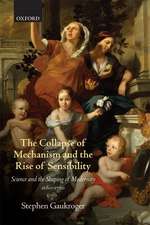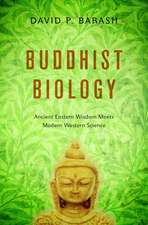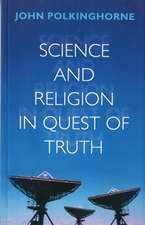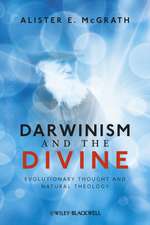In Praise of Darwin: George Romanes and the Evolution of a Darwinian Believer
Autor Professor J. David Pleinsen Limba Engleză Paperback – 20 aug 2014
| Toate formatele și edițiile | Preț | Express |
|---|---|---|
| Paperback (1) | 240.98 lei 3-5 săpt. | |
| Bloomsbury Publishing – 20 aug 2014 | 240.98 lei 3-5 săpt. | |
| Hardback (1) | 834.70 lei 6-8 săpt. | |
| Bloomsbury Publishing – 20 aug 2014 | 834.70 lei 6-8 săpt. |
Preț: 240.98 lei
Preț vechi: 274.47 lei
-12% Nou
Puncte Express: 361
Preț estimativ în valută:
46.11€ • 49.31$ • 38.45£
46.11€ • 49.31$ • 38.45£
Carte disponibilă
Livrare economică 28 martie-11 aprilie
Preluare comenzi: 021 569.72.76
Specificații
ISBN-13: 9781623565947
ISBN-10: 1623565944
Pagini: 416
Ilustrații: illustrations
Dimensiuni: 140 x 216 x 33 mm
Greutate: 0.52 kg
Editura: Bloomsbury Publishing
Colecția Bloomsbury Academic
Locul publicării:New York, United States
ISBN-10: 1623565944
Pagini: 416
Ilustrații: illustrations
Dimensiuni: 140 x 216 x 33 mm
Greutate: 0.52 kg
Editura: Bloomsbury Publishing
Colecția Bloomsbury Academic
Locul publicării:New York, United States
Caracteristici
The first book to present the full typescript of Romanes's "Memorial Poem" to Darwin
Notă biografică
J. David Pleins is Professor of Religious Studies at Santa Clara University, USA. He is the author of The Evolving God (2013), When the Great Abyss Opened: Classic and Contemporary Readings of Noah's Flood (2003), and served as an associate editor for Doubleday's The Anchor Bible Dictionary (six volumes, 1992).
Cuprins
PermissionsPreface: Hidden for a CenturyAcknowledgmentsList of Illustrations1 A Candid Examination of Theism: The Evolution of a Skeptic2 The Tolling of the Funeral Bell: The Death of Charles Darwin3 To Sleep Beneath Thy Sacred Floor: Darwin's Funeral and a Revelation of Light4 A Deathless Name: The Paradox of Fame5 Treasures of the Heart: Memories of Down House6 The Elemental War: Devilry and Harmony7 Intuition of the Infinite: The Evolution of a Seeker Chart: Typescript and Poems 1879-1889: Comparison of Poem Numbers Appendix: Charles Darwin: A Memorial PoemNotesBibliographyIndex
Recenzii
This is an extraordinary book. The author, with meticulous attention to detail, traces the historical and spiritual journey of one of Charles Darwin's most fervent admirers, George Romanes. But it is Romanes's movement from unbelief to faith in the context of Darwin's death that is, perhaps, of most significance in a post-Darwinian world plagued by skepticism about whether belief in God is ever possible. . Woven into this account Pleins puts in a number of interesting details, including a reconstruction of Darwin's house, the reading material that likely influenced Romanes, as well as specific struggles of more general importance. . Overall, the impression one has from reading this book is that Romanes was a conflicted and complicated man, racked by an obsessive attachment to Darwin, whose death left a void that he sought to fill through many and various religious alternatives.
Pleins's book doesn't focus on Romanes as an individual site of the conflict between faith and science. Instead, his book focuses on Romanes's "Memorial Poem," written in praise of Darwin at the time of Darwin's death. The lengthy poem was lost to the public for over a century, only an abridged version published. It is reprinted here in an appendix, and Pleins spends most of the book analyzing it.
Pleins's lovingly attentive account of the poem is very helpful in teasing out its engagement with theological questions, Biblical sources, biographical events and Darwinian evolution.
Some books do not fit neatly into genre categories. J. David Pleins offers us an excellent example of a multidisciplinary work with In Praise of Darwin. It is part history, part literary critique, part philosophy, and part theology.
[In Praise of Darwin] will interest all Darwin scholars and anyone thinking through the wider significance of evolution for Christian belief ... David Pleins must take his share of the credit for putting this Memorial Poem into print together with his own excellent, extensive and illuminating analysis.
[A] meticulous examination, quatrain by quatrain, of Romanes's poems ... [Pleins] presents a thoughtful and instructive reading of Victorian poetry, writing clearly and following the poem and his subject conscientiously.
This is a remarkable follow-up to the author's earlier work on Darwin's journey of faith, The Evolving God. Pleins has an exceptional sensitivity to the religious struggles of sincere seekers, especially scientists. Like Tennyson, he realizes that 'there lives more faith in honest doubt. . . than in half the creeds.' The journey into skepticism by some scientifically educated Christians was especially tormenting since it seemed to estrange them agonizingly from family members and friends. Instead of viewing the loss of faith as liberation from authoritarianism, many literate people, once they had been exposed to science and 'reason,' remained deeply tormented that they could no longer share the comforts of faith with the people they loved most. Darwin is a good example. George Romanes may be an even better one. We could hardly expect a more careful and scholarly treatment of Romanes's struggle than we have in Pleins's readable work.
In this fascinating re-investigation of the life and thought of George Romanes, the author weaves together insights from Romanes' magisterial Memorial Poem with material arising from his interactions with his hero Charles Darwin, to generate a narrative that subverts any simplistic 'science versus religion' historiography. The text is often counter-intuitive, full of surprises, and should be read by all those interested in the impact that Darwinian ideas had on the religious convictions of his contemporaries.
Whilst Tennyson's poetic musings of Darwinian evolution in In Memoriam are now well-known enough to have passed into cliché ("Nature red in tooth and claw"), George Romanes' Charles Darwin: A Memorial Poem by contrast has faded into obscurity. Now, thanks to J. David Pleins' excellent new book, Romanes' poem can assume its rightfully central place in our assessment of the reception of Darwin's scientific theories and their impact on religious belief. A combination of the fortuitous discovery of the original typescript of Romanes' poem and meticulous historical scholarship, Pleins' book guides us through the poem as key to Romanes' remarkable scientific and religious thought. Detailed, nuanced and lively, the book breaks new ground in the study of Romanes and his relation to his mentor Darwin; it also contributes significantly to wider historical work on the inter-relations of science and religion in the nineteenth century, cutting through the tired metaphors of warfare and conflict towards a more subtle account of the intellectual negotiations of those, like Romanes, immersed in both modern science and modern religion.
The recently discovered and slightly longer Typescript of the poem provides what Pleins views as a fresh means to examine Romanes's transitions from youthful faith to Darwinian skepticism, to a supposedly new belief strengthened by understanding evolution. For the author, Romanes is a champion of a particular, personal, and creative reconciliation of science and religion. The book is mostly a meticulous examination, quatrain by quatrain, of Romanes's poem, including handwritten marginalia, deletions, and additions. . A professor of religious studies at Santa Clara University, Pleins is . writing for the theological community, not for historians of science. . This of course does not mean Pleins should not be read by interested historians of science. He often presents a thoughtful and instructive reading of Victorian poetry, writing clearly and following the poem and his subject conscientiously. And is it a bad thing, when many in the United States are still trying to ban the teaching of evolution, to learn of a Darwinian who could openly grapple with his faith and seek and possibly find reconciliation, while still studying natural selection?
This is an extraordinary book. The author, with meticulous attention to detail, traces the historical and spiritual journey of one of Charles Darwin's most fervent admirers, George Romanes. . What is particularly striking in Pleins's analysis is his ability to pick up specific resonances in the "Memorial Poem" with biblical texts. Few historians, perhaps, would have sufficient scriptural knowledge to recognize the connections that Pleins makes so evident, even if occasionally this requires some imagination.
Pleins's book doesn't focus on Romanes as an individual site of the conflict between faith and science. Instead, his book focuses on Romanes's "Memorial Poem," written in praise of Darwin at the time of Darwin's death. The lengthy poem was lost to the public for over a century, only an abridged version published. It is reprinted here in an appendix, and Pleins spends most of the book analyzing it.
Pleins's lovingly attentive account of the poem is very helpful in teasing out its engagement with theological questions, Biblical sources, biographical events and Darwinian evolution.
Some books do not fit neatly into genre categories. J. David Pleins offers us an excellent example of a multidisciplinary work with In Praise of Darwin. It is part history, part literary critique, part philosophy, and part theology.
[In Praise of Darwin] will interest all Darwin scholars and anyone thinking through the wider significance of evolution for Christian belief ... David Pleins must take his share of the credit for putting this Memorial Poem into print together with his own excellent, extensive and illuminating analysis.
[A] meticulous examination, quatrain by quatrain, of Romanes's poems ... [Pleins] presents a thoughtful and instructive reading of Victorian poetry, writing clearly and following the poem and his subject conscientiously.
This is a remarkable follow-up to the author's earlier work on Darwin's journey of faith, The Evolving God. Pleins has an exceptional sensitivity to the religious struggles of sincere seekers, especially scientists. Like Tennyson, he realizes that 'there lives more faith in honest doubt. . . than in half the creeds.' The journey into skepticism by some scientifically educated Christians was especially tormenting since it seemed to estrange them agonizingly from family members and friends. Instead of viewing the loss of faith as liberation from authoritarianism, many literate people, once they had been exposed to science and 'reason,' remained deeply tormented that they could no longer share the comforts of faith with the people they loved most. Darwin is a good example. George Romanes may be an even better one. We could hardly expect a more careful and scholarly treatment of Romanes's struggle than we have in Pleins's readable work.
In this fascinating re-investigation of the life and thought of George Romanes, the author weaves together insights from Romanes' magisterial Memorial Poem with material arising from his interactions with his hero Charles Darwin, to generate a narrative that subverts any simplistic 'science versus religion' historiography. The text is often counter-intuitive, full of surprises, and should be read by all those interested in the impact that Darwinian ideas had on the religious convictions of his contemporaries.
Whilst Tennyson's poetic musings of Darwinian evolution in In Memoriam are now well-known enough to have passed into cliché ("Nature red in tooth and claw"), George Romanes' Charles Darwin: A Memorial Poem by contrast has faded into obscurity. Now, thanks to J. David Pleins' excellent new book, Romanes' poem can assume its rightfully central place in our assessment of the reception of Darwin's scientific theories and their impact on religious belief. A combination of the fortuitous discovery of the original typescript of Romanes' poem and meticulous historical scholarship, Pleins' book guides us through the poem as key to Romanes' remarkable scientific and religious thought. Detailed, nuanced and lively, the book breaks new ground in the study of Romanes and his relation to his mentor Darwin; it also contributes significantly to wider historical work on the inter-relations of science and religion in the nineteenth century, cutting through the tired metaphors of warfare and conflict towards a more subtle account of the intellectual negotiations of those, like Romanes, immersed in both modern science and modern religion.
The recently discovered and slightly longer Typescript of the poem provides what Pleins views as a fresh means to examine Romanes's transitions from youthful faith to Darwinian skepticism, to a supposedly new belief strengthened by understanding evolution. For the author, Romanes is a champion of a particular, personal, and creative reconciliation of science and religion. The book is mostly a meticulous examination, quatrain by quatrain, of Romanes's poem, including handwritten marginalia, deletions, and additions. . A professor of religious studies at Santa Clara University, Pleins is . writing for the theological community, not for historians of science. . This of course does not mean Pleins should not be read by interested historians of science. He often presents a thoughtful and instructive reading of Victorian poetry, writing clearly and following the poem and his subject conscientiously. And is it a bad thing, when many in the United States are still trying to ban the teaching of evolution, to learn of a Darwinian who could openly grapple with his faith and seek and possibly find reconciliation, while still studying natural selection?
This is an extraordinary book. The author, with meticulous attention to detail, traces the historical and spiritual journey of one of Charles Darwin's most fervent admirers, George Romanes. . What is particularly striking in Pleins's analysis is his ability to pick up specific resonances in the "Memorial Poem" with biblical texts. Few historians, perhaps, would have sufficient scriptural knowledge to recognize the connections that Pleins makes so evident, even if occasionally this requires some imagination.











